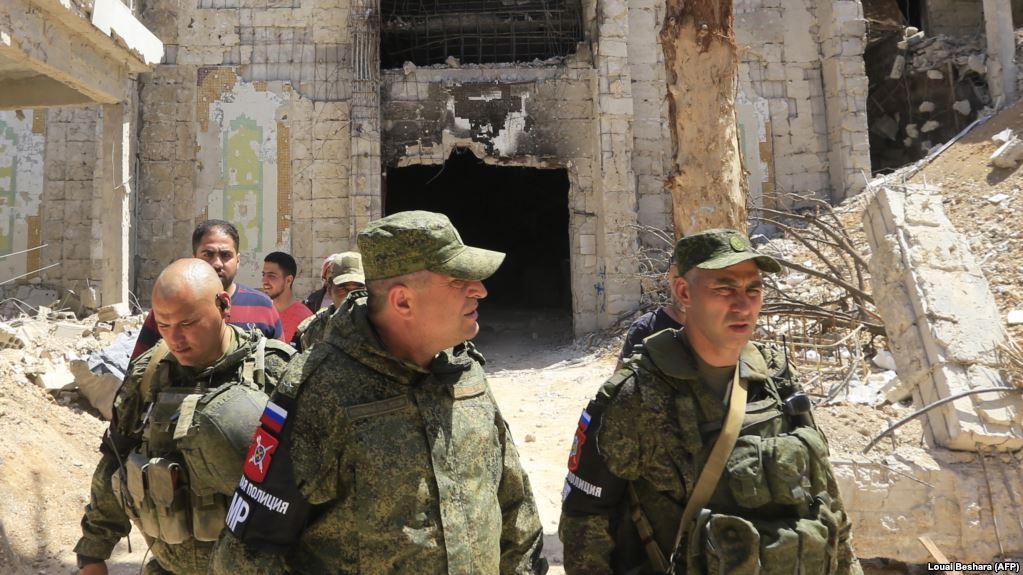
The U.S. has credible information that Russia and Syria are trying to “sanitize” the site of a suspected chemical weapons attack in Syria, the State Department has said.
Spokeswoman Heather Nauert said the team of inspectors from the Organisation for the Prohibition of Chemical Weapons (OPCW) had not been given access to the site of the alleged attack in the town of Douma on April 7.
“We have credible information that indicates that Russian officials are working with the Syrian regime to deny and to delay these inspectors from gaining access to Douma,” Nauert said. SYRIA
“Russian officials have worked with the Syrian regime, we believe, to sanitize the locations of the suspected attacks and remove incriminating evidence of chemical weapons use,” she added.
While repeating that Syria was responsible for the attacks, Nauert also said the United States had credible information that “people on the ground have been pressured by both Russia and Syria to try to change their stories.”
Western countries say scores of people were gassed to death in the attack. Russia and its ally deny that.
A U.N. security team came under fire in Syria on April 18 while doing reconnaissance for inspectors to visit the sites of the suspected attack.
Nauert said the United States worried that the evidence would “deteriorate” the longer the inspectors were delayed.
“That is of great concern to us,” she said.
White House national security adviser John Bolton told Russia’s ambassador on April 19 that better relations between the two countries required addressing U.S. concerns on election meddling, a chemical attack in Britain, and the situations in Ukraine and Syria, the White House said.
It was the first meeting between Bolton, who started at the White House this month, and Russian Ambassador to the United States Anatoly Antonov, the administration said in a statement.
Bolton told Antonov it was in the interest of both countries to have better relations, but Russia must address allegations that Moscow interfered in the 2016 U.S. election and poisoned a former Russian spy in Britain, the statement said. Moscow has denied both allegations.
The statement said the United States also had concerns about the situations in Ukraine, where Russia backs separatists, and in Syria, where Moscow’s military support has tipped the balance in favor of the Damascus government in a seven-year-old civil war.
The Syrian regime remains able to conduct chemical attacks, though only at a limited level, the Pentagon said on April 19 following last week’s international cruise missile strikes on chemical weapons-related targets.
General Kenneth McKenzie, director of the U.S. military’s Joint Staff, said Syrian President Bashar al-Assad’s regime retains a “residual” chemical capability at a variety of sites across the country.
“They will have the ability to conduct limited attacks in the future,” McKenzie told Pentagon reporters.
“However as they contemplate the dynamics of conducting those attacks, they have to look over their shoulder and be worried that we are looking at them, and we will have the ability to strike them again should it be necessary.”
Pentagon spokeswoman Dana White said there was no indication the Assad regime was preparing to launch another chemical weapons attack.
“Assad must know the world will not tolerate the use of chemical weapons under any circumstances,” she said.
On April 13, the U.S., Britain and France fired more than 100 cruise missiles at three Syrian sites, including a large research center in Damascus, in response to an alleged chemical attack in Douma that killed more than 40 people.
According to satellite imagery displayed by the Pentagon, the three sites were completely destroyed.
“We achieved the level of success that we wanted against those three targets,” McKenzie said.
“We believe that there was probably some chlorine and possibly sarin at possibly all of the sites.”
The three-star general added the Syrian regime had now returned to a “state of normalcy.”
“I don’t think we sought to change the strategic balance of the Syria conflict with those strikes. We sought to send a lesson that it’s bad practice to gas women and children,” McKenzie said.